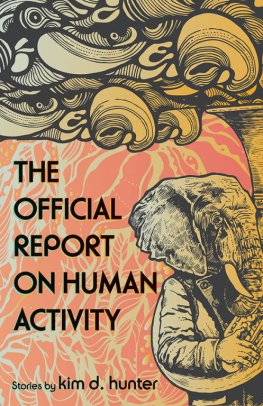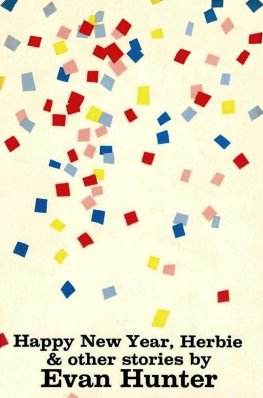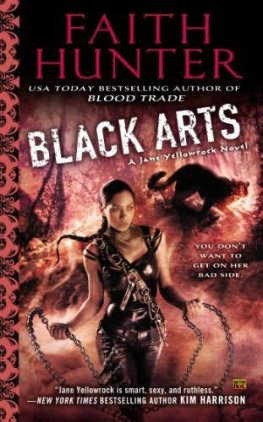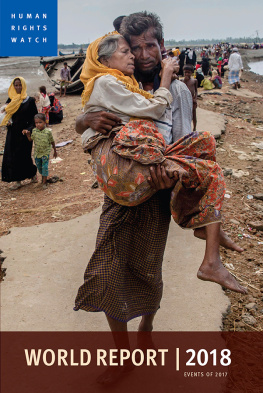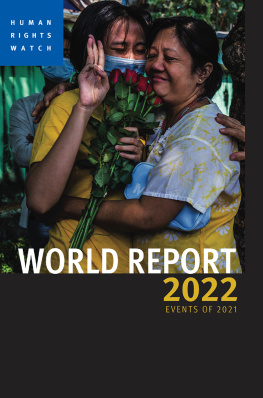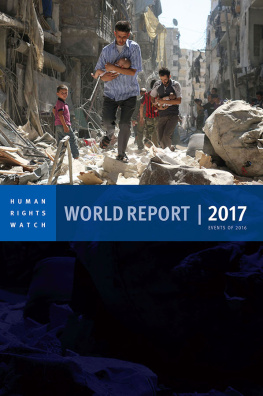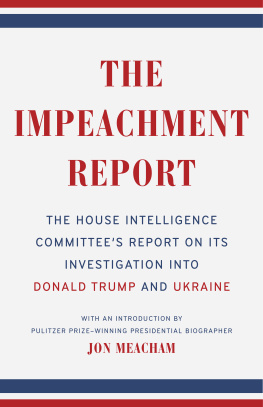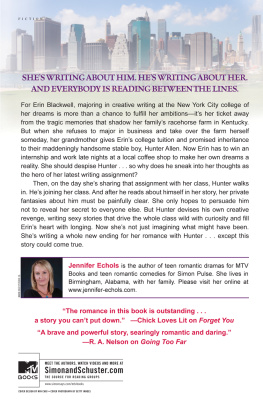THE OFFICIAL REPORT ON HUMAN ACTIVITY
Stories by kim d. hunter
The Official Report on Human Activity or Long for an Elephant
An Essay
1. Ipso in the Elephant
When Ipso gave birth to what most agreed was an elephant, there were those who tried to act as though it was normal. Well, yes, he was a man, they said, and no one had known he was pregnant, but it was, after all, a small elephant.
Prior to the birth, he had been eating strangely and spending an inordinate amount of time alone. But none around him had taken these things as signs that anything unusual was about to occur because he had said that he was a writer, or that he wanted to be a writer. He had trouble deciding which of these things to tell people, because writing happens so much in the mind that he thought it would be difficult to know when or if he had crossed the threshold. First, he would have to find something to write about.
He could write about the factory where he worked and things he and his coworkers made in the factory. He would have to start at the beginning and that would mean light in the morning. So he tried to begin with the light in his windows on the mornings he had to go to work, versus the light in his windows on the mornings he did not have to go work. The difference between daylight and worklight was much like the difference between sleep on the nights that were not followed by work days (Friday sleep and Saturday sleep) and regular sleep.
The problem was, once he began writing about the light and how he slept, it felt like he was trying to walk on slippery rocks that sloped toward quicksand, or how he imagined a slope of slippery rocks would be, as he was not much for the outdoors and tried to stay in when it rained. The fact that he could imagine these things made him lean toward saying that he was a writer as opposed to wanting to be a writer. But the fact that he had gotten his knowledge of quicksand from TV lessened his idea of himself as a writer.
If youve worked in a more modern factory than the one where Ipso worked, one built in the twenty-first century, for example, or, if youve never worked in a factory at all, count yourself relatively lucky, especially if you have found another way to get food that is less humbling and absurd than working in a plant. Second, you may not recognize the sort of factory that Ipso worked in, as it was built earlier in the twentieth century. It was noisier and dirtier than more modern factories. It was much harder to find a place where you could be alone with whatever thoughts hadnt been purged by the noise and dirt. Perhaps, the lack of time alone with thoughts made the contemplation of light and sleep seem like a grim, endlessly narrowing spiral. He didnt want to describe it as dark because he was dark and he associated the dark with warmth, standing by the oven when the sun went down in late winter with lights dimmed and the bed waiting for him to deliver the heat his body had absorbed from the small kitchen.
He was torn between trying to describe the narrowing spiral and trying to find out where it led. He thought he should describe it because that is what writers do. He wanted to find out where it led because he was frightened and fear made him curious as though he were in a lucid, recurring nightmare. Where would a narrowing path draped in factory light lead, certainly not to a screened-in summer porch with cold beer on hand and Miles Davis playing.
He thought about Miles Davis a lot. Miles was dark like Ipso, but, having lived and died in the twentieth century, Miles was obviously older. Miles produced a tone on the trumpet of unerring beauty and played, in his second great band, with younger writers whose noise was as fitted and sculpted to jagged music as Miless was to a clean, Jean Toomer narrative. What held Miles and those wilder, younger players together was that Miless melody led to the same inside dark with hidden sources of illumination.
In short, they dreamt together awake, practiced hour after hour the climb on raggedy surfaces toward the edge of a cliff whose beauty would be a fantasy if not for the climb, whose beauty could only be grasped in the moments over the white ocean of clouds rolling below the sun, the moments before the plunge where the purity and cold of the air and then the cloud overcame thought and vision respectively, a fall as blind as the stasis of the womb.
Miles didnt give many interviews. Essentially, he thought it was all there in the music, no reason to talk about what everyone could hear. For Ipso, it was very strange for a writer to eschew words, even for an interview. But Ipso could still identify with Miles because he knew Miles had had difficulty getting along. He could hear it in the alone sound of Miless trumpet and the heat beneath the loneliness, the Harmon mute at the bell of the horn honing every breath and note through a tunnel of black light to the inner ear, a path as lean and solitary as it was immutable and unforgiving, and he thought that loneliness may be the only thing he had in common with another great writer.
Ipso couldnt find a comfortable place to sit with his birth family. They were, for the most part, good, normal people of African descent who spent Sundays in church and work days working. They reveled in purchasing things with the money they earned; he was trying to make his way on slopes of wet rocks. There was one brother of his with whom Ipso could discuss the work of Miles Davis. But as soon as the conversation strayed, even to something as mild as how his brothers daughter was doing in school, the exchange became contentious.
Ipsos regular days, to say nothing of his work days, were fraught. Words would rush to the front of his brain in the factory and the work seemed two or three times more difficult than it should have been, or than it was, or than it was for the other people he worked with, or all three, which seemed a fourth possibility.
There were, to his mind, very few people who could do factory work and something else and do either thing well. There was a person back in the twentieth century who had made it to the Detroit City Council after attaining a law degree while working in the factory and, based on the interviews Ipso read, this person, Ken Cockrel Sr., had two brains. One brain coped with the factory while the other consumed law books. Ipso, on the other hand, was only able to string together a very few words and he left them in his mind, as they seemed to need to germinate.
Monkeys with torches and hand grenades riding pigs into hell seeking the enemy among them
Monkeys with the reins between their teeth and the torches and grenades in either hand,
Some with saddles some without,
Some with letters from home attesting to bloodlines,
Records that may be lost forever in the battle to come,
And who will know which among them is the writer, the enemy, or one in the same?
These words came to Ipso one stormy Monday night and festered in him deep into Saturday sleep. He tossed and turned, rolled and tumbled, wondering how to make things fit, how to get those pigs into the narrowing space. How could the monkeys be the riders, as pigs were probably smarter than monkeys and therefore would have to be the riders, even though the idea of pigs riding monkeys was laden with logistical challenges? The riders would have to be chimpanzees or at least carnivorous humans. Ipso was a carnivore himself and admired vegetarians. There were a few vegetarians in the factory, and they seemed calmer and listened to the news on stations where everyone seemed calm and smart. He thought vegetarians were smarter than he was and he so wanted to be smarter than he was.
All the great writers from Harriet Tubman to Katherine Dunham, from Charles Burnett to Fannie Lou Hamer had all been smarter than he was or seemed so at the very least. Their work rose to the high stage where it could work the brain stems, spinal cords, respiratory and nervous systems of large numbers of people, came down like invisible rain to be carried by media irrigation systems to the dry places until there were few towns where their work hadnt bloomed, fewer still where some derivation of their plants had not sprung up. People ate them without knowing where they came from and their bodies didnt care and the children they birthed with the nourishment that fused the egg and seed didnt care. Some reached back to find the source of what they had eaten and drew richness from the journey even if they had died before finding the root of the root. Others just grew.

